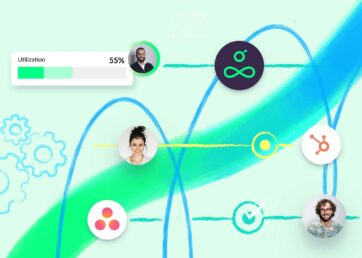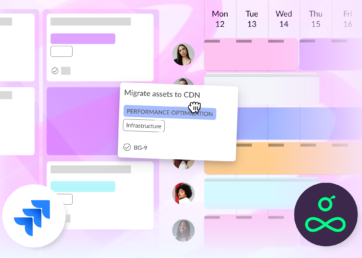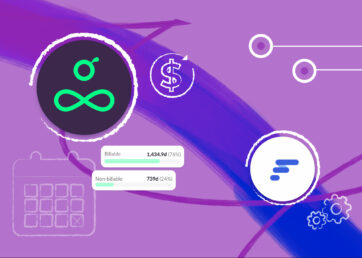Whether you’re unhappy with Float’s performance, flexibility, or schedule design—there are plenty of Float alternatives to choose from. We know there’s no one-size-fits-all solution, it all comes down to identifying the unique needs of your business and project teams.
That said, a resource management tool that centralizes your resource scheduling needs in a single platform means less time switching between tools, and more time working toward project goals.
We’ve put together a list of five top-rated Float alternatives based on customer reviews.
But first, let’s address the issues that sink Float.
In this article 📖
Why consider Float alternatives?
Float was designed specifically with smaller teams and businesses in mind. While the tool might work well for SMEs, it won’t help you optimize resource allocation and uncover inefficiencies as your business grows.
So it’s likely the time will come when your team or business outgrows Float and its limited feature set.
On leading software review sites like G2, the issues echo far and wide as Float falls further behind its main competitor Resource Guru.
3 common Float frustrations
While Float is often praised as a leader in the resource management category, it falls short in critical areas.
1. Schedule design
The schedule is the heartbeat of any resource scheduling software. An effective scheduling experience is what enables PMs and project leads to do effective capacity planning and optimize allocation. And we’re not just talking about project teams, this includes other resources such as equipment and meeting rooms, too.
So if your schedule is not up for the task, you’ve got an issue on your hands.
One user, Marco M. explains “I am not crazy about the graphic style of the calendar / schedule view hiding over the weekend; it is difficult to see at a glance the separation between the various weeks. Also there is no translation of the portal in Italian, not a serious deficiency, but if there were it would be better :) It also lacks the ability to view your schedule in a daily agenda format in order to have a more precise schedule of your commitments, as you can do through outlook.”
Another user, Roger V. on Get App says “I get very disoriented when scrolling in two dimensions through the enormous grid, it can be confusing to search through such a large spread of information.”
Float users have also pointed out the tool’s sensitivity when adjusting time blocks near weekends. The software tends to unintentionally extend weekends, triggering unnecessary notifications. Enough of these mishaps may become tedious when using the tool.
2. Performance and reliability
One of the key challenges with Float is its inconsistency in displaying updates in the schedule. Users have reported experiencing issues where changes made by team members aren’t immediately reflected on the schedule.
This is particularly problematic for fast-paced teams where project schedules might be updated frequently throughout the day. Adding to it, if, for example, email notifications aren’t quick enough, teams might miss important meetings and other changes that impact project success.
A Design Director airs his grievances on G2, sharing that “screen reloads are not always automatic, which is very frustrating when every manager may need to check the schedule 8-10 times a day and make edits.”
A lead Designer shares the sentiment on G2, saying “the calendar synchronization works but is slow to show changes.”
Further reading: Sync both ways with Google Calendar 📅
Synchronize your Resource Guru schedule with Google Calendar, so you can have full visibility of team availability, all in one place.
3. Limited reporting
Float doesn’t currently offer a wide range of in-depth reporting features, which can be a problem for businesses that require detailed financial tracking and more granular data analysis. A lot of customers mention using other tools alongside Float because of this.
One customer on G2 shares that “The reporting part is very weak. A lot of people in the office like the tool, I think, but for me it’s not the best because some basic things are missing.”
Plus, the reporting section seems to be particularly difficult to get to grips with as customers share that it “was quite a steep learning curve initially, especially with reporting” and that “the reporting is hard to understand initially.”
If you’d like to avoid headaches like these and choose a resource management tool that can scale with your business, below are five great alternatives to Float to consider.
Resource Guru – The best Float alternative for teams of all sizes
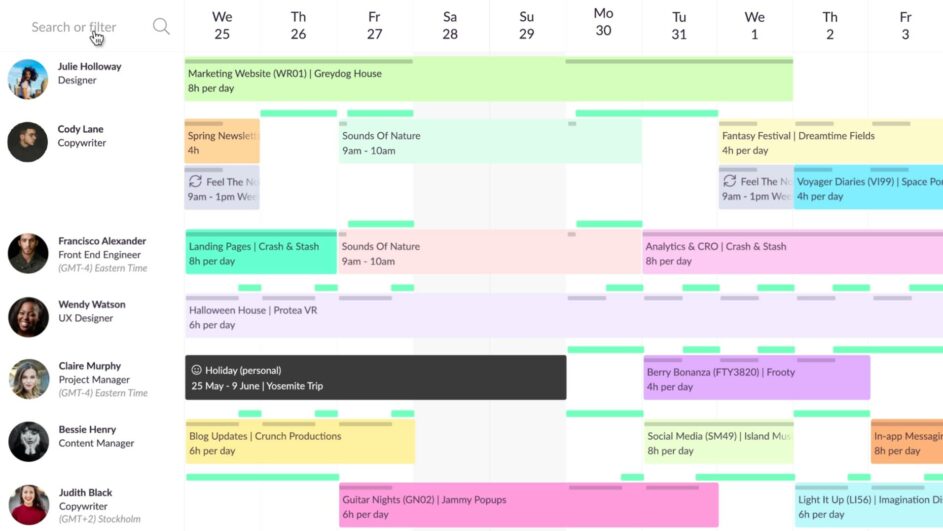
Schedule view in Resource Guru, giving you a birds-eye view of availability and allocation.
🌱 Founded: 2011
⭐️ Customer ratings: G2 4.7/5, Capterra 4.7/5
👌 Pros: Ease of use, fast implementation, comprehensive scheduling features
👎 Cons: Reporting isn’t as comprehensive as some other tools
💰 Pricing: Starts at $4.16 per person per month
👀 Free trial: Yes, 30 days
When it comes to Float alternatives, look no further than Resource Guru. For teams that need a simple yet powerful all-in-one resource management tool that helps fuel project success as well as supports business growth—this is it.
Praised for its design, quick implementation, ease of use, and scheduling features, customers who choose Resource Guru often don’t leave.
Resource Guru’s key features
- Get a birds-eye view of your team and resources in the Schedule
- Manage a remote team with time zone support
- Manage equipment and book meeting rooms alongside employees
- Track your team’s time with the fastest and easiest timesheets in the industry
- Stay on top of PTO, sick days, and other downtime with leave management
- Keep an eye on the Activity Log to see changes made to bookings
- Use Custom Fields to tag, filter, and find the right people based on unique criteria
- Create and edit bookings for multiple people in one go with multi-resource bookings
- Create repeat bookings for projects that require e.g. weekly check-ins
- Get a single schedule view by connecting to Google Calendar, Outlook Calendar, and iCal
- Use booking approvals to protect your in-demand people
- Get a clear overview of your day with a personalized dashboard
- Prevent scheduling chaos with a robust clash management engine
“The platform provided an effective solution for resource management and scheduling, improving the efficiency and productivity of our team. The intuitive interface and scheduling features made it easy to allocate resources and track project progress. The platform’s reliability and real-time updates ensured that everyone had access to the most up-to-date information. Although there were some limitations in terms of integrations, the overall experience with Resource Guru was excellent.”
Customer input: Resource Guru as the best alternative to Float
When directly comparing the two tools, here’s the conclusion:
- Reviewers felt that Resource Guru meets the needs of their business better than Float
- When comparing the quality of ongoing product support, reviewers felt that Resource Guru is the preferred option
- For feature updates and roadmaps, our reviewers preferred the direction of Resource Guru over Float
- Reviewers also preferred doing business with Resource Guru overall
Source: G2
Further reading: Read this dedicated guide on how Resource Guru compares to Float to help you choose a tool that fits your needs 💪
Kantata (formerly Mavenlink) – A great alternative for mid-market professional service companies

Resource Dashboard in Kantata.
🌱 Founded: 2008
⭐️ Customer ratings: G2 4.2/5, Capterra 4.2/5
👌 Pros: Collaboration functionality and robust reporting featuress
👎 Cons: Limited customization and steep learning curve
💰 Pricing: Request a quote
👀 Free trial: No
Kantata (formerly Mavenlink) is a great Float alternative for small to midsize companies looking for a tool with a comprehensive feature set.
From resource allocation and project collaboration and project forecasting and budgeting, Kantata squeezes it all together in one platform.
But while touting itself as a “Professional Services Cloud,” Kantata falls short when it comes to usability, and its cumbersome interface can sometimes be frustrating for users.
One customer, Jake D., shares his views on G2, saying “some of the UI is difficult to navigate. There are a lot of great reports but exporting basic data can get frustrating. They could use better estimating functionality for project scoping but I believe they are currently updating.”
Kantata was formed when Mavenlink merged with Kimble back in 2022 and it might be worth noting that as the two tools continue to integrate, it could cause frustration in terms of both functionality and usability.
Teamdeck – A solid alternative for small agencies

Schedule view in Teamdeck.
🌱 Founded: 2016
⭐️ Customer ratings: G2 4.6/5, Capterra 4.3/5
👌 Pros: Quick to set up, simple and effective
👎 Cons: Can get both busy and buggy
💰 Pricing: Starts at $0.9 for a basic resource
👀 Free trial: Yes, 7 days
Similar to the preferred Float alternative, Resource Guru, Teamdeck is also a resource management tool for agencies.
On G2, customers are talking about how easy it is to capture resource utilization and billable time. So if you’re an agency traffic manager at a small agency, this might be the tool you’ve been looking for.
But be aware the customers note that the reports section can be iffy. Augusto C. voices his concerns on G2, sharing that “I dread the reports section, due to the fact that I have seen it supply incorrect numbers. Additionally, I don’t locate it very easy to make use of and conveniently customizable.”
Ultimately, depending on what your agency project management processes look like, the tool might be on the simplistic side and not ready to scale as your agency grows.
Smartsheet – Best Float alternative for enterprise teams

Calendar view in Smartsheet.
🌱 Founded: 2005
⭐️ Customer ratings: G2 4.4/5, Capterra 4.5/5
👌 Pros: Comes with plenty of features and integrations
👎 Cons: Basic resource scheduling features
💰 Pricing: Free plan (1 user)
👀 Free trial:No (free plan available)
Smartsheet offers a range of features and capabilities that make it a great alternative to Float, specifically for enterprise organizations.
Not just a resource scheduling tool, Smartsheet is a comprehensive work management system that helps you manage projects and processes at scale. It offers robust workflow automation that streamlines complex processes.
However, when it comes to resource scheduling functionality, Smartsheet can fall short. One customer on G2, Young L., notes that “it does have limitations on keyboard shortcuts. The scheduling feature is pretty basic, so if you need a more robust scheduling tool that includes features such as resource allocations, this is coming up short.”
So if you need a scheduling tool for workload planning, other alternatives listed here might be a better choice.
Overall, Smartsheet is a great Float alternative for enterprise teams that require a more sophisticated work management platform.
Runn – Best alternative for budget management

Project view in Runn.
🌱 Founded: 2018
⭐️ Customer ratings: G2 4.5/5, Capterra 4.8/5
👌 Pros: Easy to use and plenty of features
👎 Cons: Limited reporting features, need for more granular permissions
💰 Pricing: Free (up to five people)
👀 Free trial: No (free plan available)
A relative newcomer on the scene compared to the rest, Runn has proven to be a great alternative to Float as it focuses on performance and profitability. Similar to Resource Guru, it’s specifically aimed at professional services aiming to improve both agency efficiency and agency workflows.
Runn offers a handful of native integrations, but if you require a specific setup for reporting, be prepared to invest some time in getting everything working nicely together.
On software review platform Capterra, one customer shares that “With a lot of pre-existing tools (time-keeping, invoicing, business intelligence), it took a bit of time to get everything integrated nicely. While they do have out-of-the-box integrations that might suit your needs well, we found our needs too specific and needed to make custom integrations. That said, their APIs have meant that we could do this integration reasonably easily.”
But if you’re looking for a Float alternative that can handle resource management challenges beyond just booking clashes and overallocation, then you might want to go for a more established tool. Plenty of Runn customers continue to point out that it’s a “fairly new” tool, and because of this, it’s still missing a lot of features that you would expect in a resource management platform.
The best Float alternative for your team
While there are plenty of Float alternatives going around, Resource Guru stands out as the most user-friendly and fastest to implement—all while boasting lots of features that create a seamless scheduling experience.
Proven to be a tool that works for businesses and teams of all sizes, it’s the favored Float alternative that will scale alongside your business.
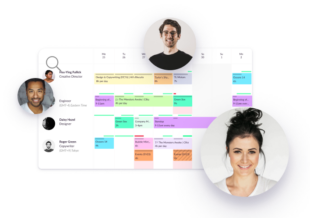
The #1 scheduling tool trusted by thousands of project teams
Join thousands of project managers who have made scheduling a breeze.



